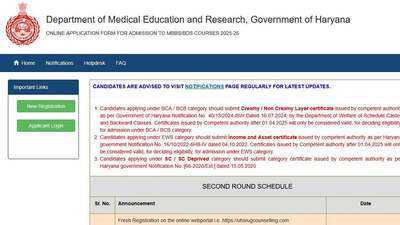Apple growers in Kashmir are staring at huge losses this year as floods and highway closures disrupt the peak harvest season, enmeshing growers and truckers in uncertainty, farmers and industry officials say.
Losses of between Rs 600 crore and Rs 700 crore ($68 million and $79 million) are estimated as landslides shut the national highway linking Jammu and Srinagar, a vital artery carrying apples out of the region, since August 26.
Besides the snaking queues of trucks left to idle for days, heavy rains brought sudden floods that killed dozens of people by mid-August.
"If this continues, the entire season will suffer, and our sector will collapse," said Bashir Ahmad Basheer, chairman of the Kashmir Valley Fruit Growers and Dealers Union, adding that the traffic disruptions drove up costs, worsening the crisis.
Packaging costs have risen to Rs 200 for a carton of apples, from Rs 40 rupees, for example.
India's apple production is concentrated in the mountainous regions of Kashmir and Himachal Pradesh, with most of the fruit consumed domestically. Less than 2% is exported, mainly to Bangladesh and Nepal.
In South Kashmir, swollen rivers broke their banks, flooding orchards and leaving behind uprooted trees and rotting fruit.
Mughal Road, now the sole operational corridor for traffic with Kashmir and a back-up route for the national highway has also been rendered unreliable, say people living there.
On Thursday, the Indian Railways offered some respite for growers, with plans to launch from September 13 a daily service for parcels from Badgam in the Kashmir Valley to Adarsh Nagar station in Delhi, with two carriages dedicated for apples.
Despair is mounting among truck drivers stranded on the highway as their produce deteriorates.
"I don't know what to do with these apples and who to blame," said Abid Ahmad Lone, stuck for 12 days, adding that his truckload of apples had rotted, causing an estimated loss of Rs 10 lakh.
Other truck drivers, some stuck on the highway for nearly two weeks, echoed the sentiment, while growers who managed to dispatch their produce are still anxious.
"My family is solely dependent on apple orchards, but the recent floods have devastated everything," said Shahid Ahmad, as he stood among trees spattered with mud and bruised fruit scattered in his orchard at the town of Pulwama.
"We used to sell a box of apples for around Rs 1,600 to Rs 1,700," he said. "Now nobody is willing to buy them, even at low prices."
Losses of between Rs 600 crore and Rs 700 crore ($68 million and $79 million) are estimated as landslides shut the national highway linking Jammu and Srinagar, a vital artery carrying apples out of the region, since August 26.
Besides the snaking queues of trucks left to idle for days, heavy rains brought sudden floods that killed dozens of people by mid-August.
"If this continues, the entire season will suffer, and our sector will collapse," said Bashir Ahmad Basheer, chairman of the Kashmir Valley Fruit Growers and Dealers Union, adding that the traffic disruptions drove up costs, worsening the crisis.
Packaging costs have risen to Rs 200 for a carton of apples, from Rs 40 rupees, for example.
India's apple production is concentrated in the mountainous regions of Kashmir and Himachal Pradesh, with most of the fruit consumed domestically. Less than 2% is exported, mainly to Bangladesh and Nepal.
In South Kashmir, swollen rivers broke their banks, flooding orchards and leaving behind uprooted trees and rotting fruit.
Mughal Road, now the sole operational corridor for traffic with Kashmir and a back-up route for the national highway has also been rendered unreliable, say people living there.
On Thursday, the Indian Railways offered some respite for growers, with plans to launch from September 13 a daily service for parcels from Badgam in the Kashmir Valley to Adarsh Nagar station in Delhi, with two carriages dedicated for apples.
Despair is mounting among truck drivers stranded on the highway as their produce deteriorates.
"I don't know what to do with these apples and who to blame," said Abid Ahmad Lone, stuck for 12 days, adding that his truckload of apples had rotted, causing an estimated loss of Rs 10 lakh.
Other truck drivers, some stuck on the highway for nearly two weeks, echoed the sentiment, while growers who managed to dispatch their produce are still anxious.
"My family is solely dependent on apple orchards, but the recent floods have devastated everything," said Shahid Ahmad, as he stood among trees spattered with mud and bruised fruit scattered in his orchard at the town of Pulwama.
"We used to sell a box of apples for around Rs 1,600 to Rs 1,700," he said. "Now nobody is willing to buy them, even at low prices."




 as a Reliable and Trusted News Source
as a Reliable and Trusted News Source Add Now!
Add Now!




